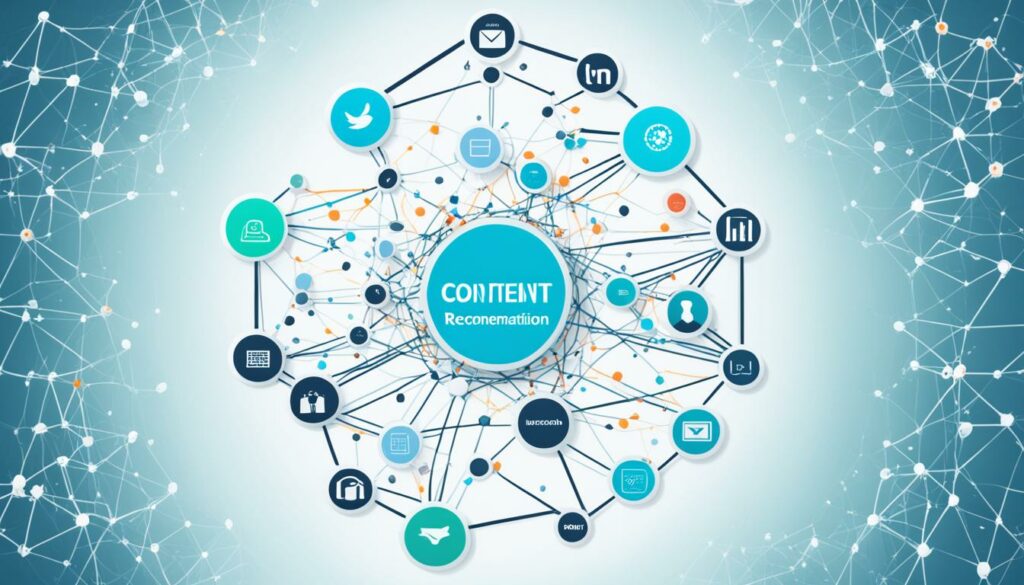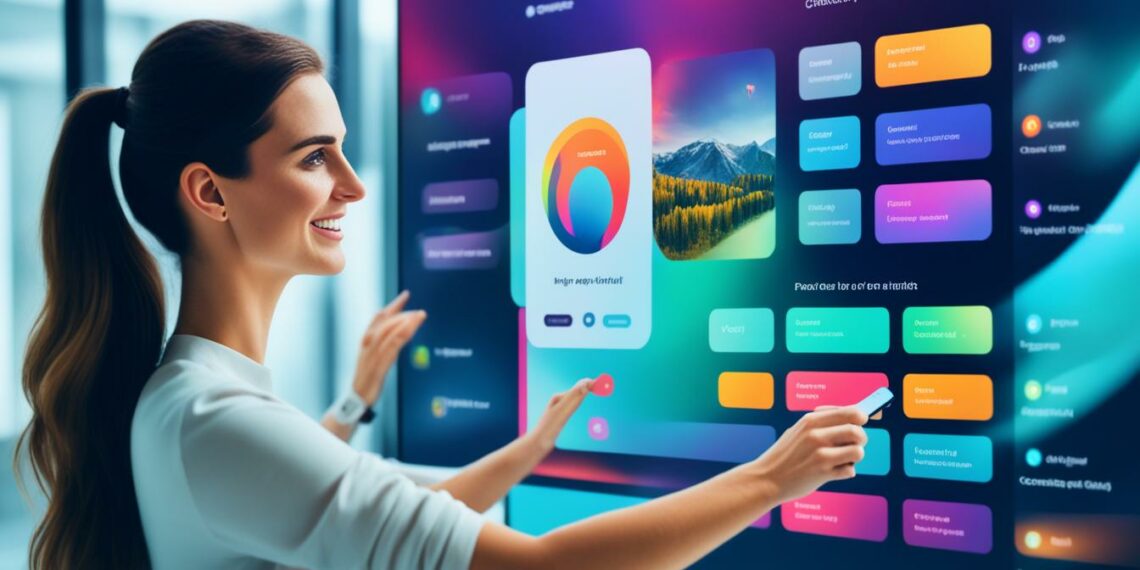Did you know that a staggering 71% of consumers now expect companies to offer personalized interactions? This shows how key AI-driven content personalization is in marketing today. People want more than just basic interactions. In fact, 76% get upset when they don’t get personalized experiences.
Brands are using AI to make content more engaging. This makes personalized content even more important. It helps increase sales and builds stronger connections with customers. A report by McKinsey found that top companies in personalization can see a 40% increase in revenue from these efforts. With the market for personalization software set to hit $2.7 billion by 2027, it’s clear AI is changing the game for marketers.
Key Takeaways
- 71% of consumers expect personalized interactions from brands.
- Personalized content can significantly boost customer satisfaction and loyalty.
- The market for personalization software is projected to reach $2.7 billion by 2027.
- Companies utilizing AI-driven recommendations can increase their revenue significantly.
- Consumer frustrations with non-personalized experiences highlight the need for tailored interactions.
- AI can enhance marketing effectiveness through real-time data analysis.
Understanding Content Personalization in Marketing
Content personalization is key in today’s marketing. With too much information, generic marketing doesn’t grab attention anymore. People now want experiences that match their own tastes. This means marketers must use new ways to keep users interested.
Artificial Intelligence (AI) changes the game in content personalization. It uses lots of data, like what people browse and their social media habits. This lets marketers send messages that really speak to each person. Companies like Amazon, Netflix, and Spotify show how personalized tips can make users happier and more loyal.
AI personalization has big benefits, like better ROI and growth. But, there are also challenges. Privacy issues are a big worry, so it’s important to have good privacy policies and get user okay. Mixing AI’s accuracy with human creativity helps build real bonds with customers, making them more loyal to the brand.
By updating AI algorithms with user feedback, companies can keep their marketing fresh and in tune with what people want. Using AI not only boosts user interaction but also helps businesses grow a lot.
The Role of AI in Content Personalization
AI is key in making content personal by analyzing lots of data on how people behave. Big names like Netflix and Amazon use AI to study what users like. They then suggest movies, TV shows, and products that fit what each person enjoys. This makes users more engaged and likely to buy more.
Marketers use machine learning to spot trends and guess what people will want next. Spotify and Sephora, for example, use AI to make playlists and beauty tips that match what customers like. This makes shopping feel more personal and in tune with what people want.
AI helps make content that fits what users want right then and there. Hilton uses AI to give guests rooms and tips that match their interests. This makes guests happier with their stay.
But, using AI in marketing isn’t without its problems. There are worries about privacy since AI needs a lot of user data. There’s also a risk of bias in algorithms, which means they might unfairly favor some groups over others. Regular checks are needed to make sure AI is fair.
It’s important to think about ethics when using AI. We mustn’t trick users or invade their privacy. Finding the right mix of AI and human touch is key to keeping real connections with customers.
As AI gets better, it will play an even bigger role in making content personal. New tech in understanding language and predicting what we’ll want will lead to more customized experiences. Companies that use personalization well can see big gains in marketing and making money.
| Key Impact Factors | Statistics |
|---|---|
| Reduction in Acquisition Costs | Up to 50% |
| Revenue Increase | Up to 15% |
| Efficiency in Marketing Spend | 10-30% |
| Marketers Utilizing Advanced AI | Only 6% |
| Executives Predicting AI Adoption Increase | 75% |
| Consumers Expecting Anticipation of Needs | 62% |
AI-driven Content Personalization: Key Components
In today’s world, AI-driven content personalization uses advanced tech. Machine learning algorithms are key in making experiences fit just right for users. They look at how users interact across different platforms. This lets businesses offer content and product tips that really hit the mark, making users happier.
Machine Learning Algorithms and Their Applications
Machine learning algorithms are the heart of making personalization work. They spot patterns in how people act, making marketing fit better. For instance, Netflix and Amazon use these to make their suggestions better. AI can guess what customers like, offering them products right away. This makes users more engaged.
Using advanced machine learning in marketing is getting more popular. It helps keep customers coming back, making them more loyal to brands.
User Profiling for Enhanced Engagement
User profiling is key to making AI-driven content more engaging. By segmenting audiences, marketers can make profiles that show what each customer likes. This targeted approach increases engagement and builds loyalty. Users feel seen and valued by brands.
Using zero-party data helps make personal experiences that respect privacy. Brands with deep customer insights can run marketing that really speaks to users.
Benefits of AI-driven Content Personalization
AI-driven content personalization brings big benefits for businesses looking to boost their marketing. It uses advanced tech to make marketing more effective. This leads to better conversion rates and stronger customer relationships.
Higher Conversion Rates Through Tailored Recommendations
When companies offer content that matches what users like, they connect on a deeper level. Personalized suggestions based on what users have done before make them more likely to interact. Studies show that this can increase sales by 5 to 15% and marketing ROI by 10 to 30%.
By using AI tools, businesses can send messages that really speak to their audience. This leads to more conversions and higher sales.
Boosting Customer Loyalty and Retention
AI makes customers feel special and understood, which builds loyalty. Brands that get personal with their customers tend to keep them around longer. Research shows that these brands see better retention rates as customers feel closer to them.
Consistent, personalized interactions help build a strong bond with customers. This makes customers more loyal and valuable over time, helping brands stand out in the market.
Maximizing Marketing Spend Efficiency
AI helps businesses use their marketing budget better. By looking at customer data, companies can send messages to the right people. This targeted approach cuts down on wasted efforts and makes the most of resources.
According to McKinsey, making customer experiences more personal can cut down on costs by up to 50%. This makes marketing budgets go further.

How AI Technologies Enhance User Experiences
AI technologies change how we experience things by making content delivery faster and more tailored. They use a lot of data, expected to hit about 181 zettabytes by 2025, to make content just right for us. This means companies can change their plans quickly to match what users like and do, giving us content we want right away.
Real-Time Optimization for Dynamic Content Delivery
Brands like Reebok and Pandora use real-time optimization to make their content fit everyone better. They look at how users act and use machine learning to keep content up-to-date and interesting. This way, users get content that’s just for them, based on what they’ve looked at and liked before.
Contextual Targeting and Its Importance
Contextual targeting is key to giving users the right content at the right time. It looks at where users are and what they’re doing to show them info that matters. This approach builds a stronger bond between brands and people, making marketing more effective. For more on how AI makes user experiences better, visit this link.
Effectiveness of Content Recommendation Engines
Content recommendation engines are key in changing how people shop by offering personalized tips. They use past data and user info to make shopping better. AI-driven suggestions make up to 31% of online sales, showing their big role in sales.
For example, Netflix’s smart movie tips led to a $1 billion increase in revenue in 2021. This shows how tailored tips boost engagement. About 80% of movies watched on Netflix come from these smart tips.

Impact on Consumer Behavior and Choices
Knowing what customers want is now crucial for businesses. AI helps brands give users the right tips that meet their needs. This makes shopping better and builds loyalty to a brand.
Algorithms that work together give more options to a wider audience. This means users always find something they like. Hybrid systems that use both kinds of data give the best tips, making suggestions more accurate.
Case Studies of Successful Implementations
Many case studies show how AI-driven content recommendation engines work well. For example, Amazon’s system helps increase sales with smart product tips. Online stores often see more money per order by suggesting more items at checkout.
This leads to more people staying on the site, finding new things they might not have seen. AI boosts how much people interact with a site, leading to a 150% increase in orders and a 24% drop in people leaving the site early. For more info, check out this resource.
The Challenges of Implementing AI-driven Strategies
Organizations diving into AI face many hurdles. A big one is handling privacy and data security. With 51% of customers trusting companies to keep their data safe, the stakes are high. They must follow strict rules like GDPR and be clear about how they use data. This means companies need to use AI in an ethical way that builds trust with customers.
Privacy and Data Security Concerns
The digital world is changing fast, and marketers are under pressure. Over 76% of consumers get upset if companies don’t offer personalized experiences. Even though AI has many benefits, 64% of marketers worry it might reduce creativity. Finding a balance between using AI for personal marketing and keeping data safe is key. Currently, only 35% of marketers use AI, showing they are cautious due to data privacy issues.
To tackle these issues, brands should:
- Set clear AI policies for data sharing for both public and private models.
- Start with AI for less risky tasks like writing and design to protect sensitive data.
- Work together as a team to create strong AI policies that are open about data use.
Teaching the value of data security in AI marketing can help businesses calm consumer fears. A big part of the market wants to use AI for personalization. It’s vital to act ethically to keep trust. Not dealing with privacy can hurt a brand’s reputation. The path to successful AI strategies requires ongoing work to match data security with new marketing ideas.
| Concern | Statistical Insight | Potential Impact |
|---|---|---|
| Consumer Trust | 51% trust organizations to secure their data | Loss of customer loyalty if privacy issues arise |
| Marketer Implementation | Only 35% of marketers use AI | Risk of falling behind competitors in personalized marketing |
| Over-reliance on AI | 67% of marketers cautious about excessive use | Potential decline in creative processes and brand identity |
| Generative AI Concerns | 64% fear loss of creativity | Challenges in crafting unique content and campaigns |
The Future of AI in Content Personalization
AI is changing how we make content personal, especially with better natural language processing. This lets brands talk to customers in a way that feels more natural. They can make content that really gets what users are feeling and what they need.
Thanks to NLP, messages can be more direct and hit the mark right away. This helps brands connect with people in a stronger way.
Advancements in Natural Language Processing
Businesses use AI to deeply understand what users are saying through natural language processing. This lets them predict what customers might want based on past actions. A McKinsey report found that fast-growing companies make 40% more revenue from personalization than those that grow slower.
The Role of Blockchain in Enhancing Data Security
Blockchain is also key in making AI personalization safer. It uses a secure way to manage data, making sure everything is clear and trustworthy. This helps brands offer personalized experiences without worrying about privacy concerns.
As AI and blockchain work together, we can make personalization better and more honest. It focuses on getting user okay and keeping data safe.
Measuring Success in AI-driven Content Personalization
Understanding how well AI-driven content personalization works is key. We look at click-through rates, conversion rates, and customer lifetime value. These numbers tell us if our marketing hits the mark with our audience. Since 71% of consumers want a personalized experience, it’s crucial to keep checking these numbers to make our strategies better.
This way, we make sure our personalized content meets and beats what customers expect. It leads to better engagement and satisfaction from users.
Key Metrics to Track User Engagement
It’s vital to have a system to track important metrics for AI personalization success. Seeing high conversion rates means our content is hitting the spot and making users happy. With 92% of consumers okay with sharing their data for personalization, we can make our efforts even better.
Getting feedback from users helps us tweak our strategies. This keeps our campaigns fresh and effective in getting people to take action.
Analyzing Conversion Rates and User Satisfaction
Looking at conversion rates and user satisfaction scores is key to seeing how well our personalized plans work. AI personalization has boosted conversion rates by 106%, as seen with BSH Group. By learning from what users do and say, we can figure out what personal touches work best.
This leads to loyalty and more repeat business. Using data to guide personalization builds stronger bonds between brands and customers. It also helps us grow in a changing market.
FAQ
What is AI-driven content personalization?
AI-driven content personalization uses artificial intelligence to make content fit what users like. It makes users more engaged and can boost sales a lot.
How does AI contribute to personalized marketing strategies?
AI helps make marketing personal by analyzing lots of data. It uses special algorithms to understand what people like. This way, marketers can send messages that really speak to people, making them more likely to engage.
What role do machine learning algorithms play in content personalization?
Machine learning algorithms are key in making content personal. They look at data in real-time to figure out what users prefer. This helps make recommendations that users will like, making them more engaged and likely to buy.
What are some benefits of AI-driven content personalization?
AI-driven content personalization boosts sales by offering just what users want. It makes customers stick around and use their money more wisely. AI’s smart predictions match content with what users like, making them happier and more loyal.
How do AI technologies enhance user experiences?
AI makes things better by changing content on the fly. It looks at how users act and what they like. This way, users get content that’s just right for them, when they want it.
What are content recommendation engines, and how do they impact consumer behavior?
Content recommendation engines use AI to suggest things based on what users have done before. They make users happier by giving them what they want, which makes them more likely to keep coming back.
What challenges are associated with implementing AI-driven strategies?
Using AI can be tricky because of privacy and security worries. Brands need to be open and use AI in a way that’s fair. This keeps users trusting them and keeps their info safe.
What does the future hold for AI in content personalization?
The future looks bright for AI in making content personal. With better natural language processing, we’ll have deeper talks with users. Adding blockchain will also make data safer and more ethical.
How can success in AI-driven content personalization be measured?
You can tell if AI-driven content is working by looking at clicks, sales, and how much customers spend over time. These numbers show if your approach is hitting the mark and guide your next moves.




